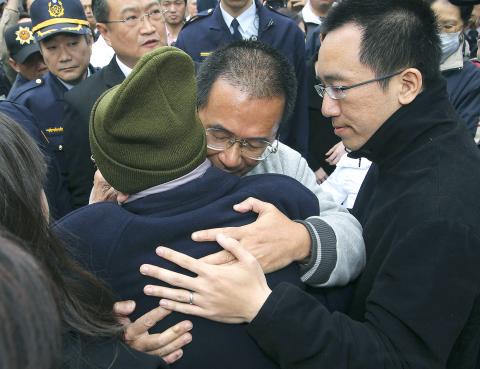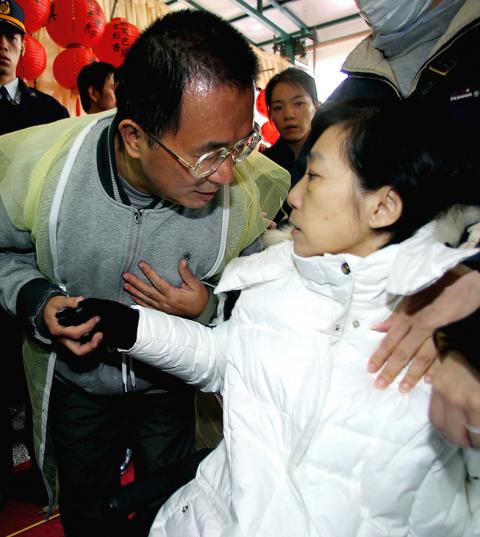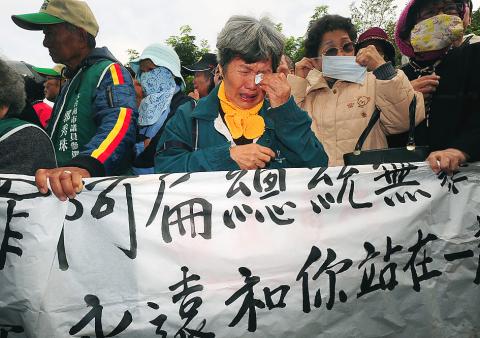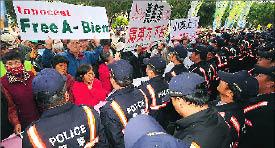Former president Chen Shui-bian (陳水扁) fulfilled his familial obligation to pay his last respects to his late mother-in-law in Greater Tainan early yesterday amid massive police presence and a large crowd of eager supporters who gathered at the funeral home to greet him.
Escorted by prison officers and police, Chen arrived on a minibus at about 8:50am at the funeral home where the traditional mourning ceremony was to be held for Wu Wang Hsia (吳王霞), who died on Dec. 31 at the age of 85.
Greater Tainan remains an important support base for the Democratic Progressive Party (DPP), once chaired by Chen, who is currently serving a 17-and-a-half-year jail term for corruption.

Photo: Reuters
As soon as he got off the bus, the former president went down on his knees and crawled into the building as part of a traditional rite. He was not shackled or handcuffed.
In the elegy he delivered, a -tearful Chen recalled that he last met Wu in June 2009 when she attended a court hearing to testify on his behalf, and he referred to himself as “unfilial” for not seeing her before she passed away.
Chen also expressed his gratitude to his late mother-in-law for supporting his marriage to her daughter, former first lady Wu Shu-jen (吳淑珍).

Photo: Chu Pei-hsiung, Taipei Times
He said his wife inherited her sense of justice and “Taiwanese consciousness” from her mother, and had encouraged him to enter politics.
In an apparent attempt to burnish his wife’s reputation, which has been tainted by a conviction for graft, Chen said she was not a money-hungry person, as has been claimed.
He said that it was his wife who advised him to cut his own salary in half soon after he assumed the presidency in 2000.

Photo: AFP
The former president said he “definitely did not do the Taiwanese people wrong” or let his supporters down and expressed the hope that the judiciary would prove his innocence and see that justice is done in his various cases.
Chen’s address was followed by chants of “the judiciary is dead” and “A-bian is innocent” from a crowd of supporters that gathered at the funeral home to greet him.
More than 300 supporters waited outside the venue to show their support for Chen.

Photo: AFP
“I was very moved and very saddened by Chen’s talk,” said one of his supporters, Yang Chao, as she clutched a doll in the former president’s likeness.
Others chanted slogans against President Ma Ying-jeou (馬英九) of the Chinese Nationalist Party (KMT), including “Ma step down.”
Prior to his departure, Chen held a brief and emotional meeting with his mother, Chen Li Shen (陳李慎), as the two hugged and tears were shed.
At 11:02am, Chen was escorted back to the prison after spending two hours at the funeral home.
According to the former president’s office, about 600 police were deployed at the funeral home.
The office protested the heavy police presence, accusing the authorities of treating the former president as if he was a murderer and his supporters like rioters.
Chen Shui-bian and family members have been implicated in a complex network of cases that have led to them being accused of sending political donations and secret diplomatic funds abroad, laundering millions of US dollars and taking kickbacks on government contracts.
The former president has said that the cases are politically motivated and part of a vendetta waged against him in retaliation for his eight years in power, when he sought to push Taiwan toward a more formal independence from China.
In December 2010, Chen Shui-bian and his wife were each sentenced to a total of 17-and-a-half years in prison for taking bribes during his term in office.
Wu Shu-jen, who is in poor health and requires constant care, has had her incarceration postponed indefinitely after a prison hospital refused to admit her in February last year. She has been confined to a wheelchair since being run over by a truck in the 1980s.

MAKING WAVES: China’s maritime militia could become a nontraditional threat in war, clogging up shipping lanes to prevent US or Japanese intervention, a report said About 1,900 Chinese ships flying flags of convenience and fishing vessels that participated in China’s military exercises around Taiwan last month and in January have been listed for monitoring, Coast Guard Administration (CGA) Deputy Director-General Hsieh Ching-chin (謝慶欽) said yesterday. Following amendments to the Commercial Port Act (商港法) and the Law of Ships (船舶法) last month, the CGA can designate possible berthing areas or deny ports of call for vessels suspected of loitering around areas where undersea cables can be accessed, Oceans Affairs Council Minister Kuan Bi-ling (管碧玲) said. The list of suspected ships, originally 300, had risen to about 1,900 as

Japan’s strategic alliance with the US would collapse if Tokyo were to turn away from a conflict in Taiwan, Japanese Prime Minister Sanae Takaichi said yesterday, but distanced herself from previous comments that suggested a possible military response in such an event. Takaichi expressed her latest views on a nationally broadcast TV program late on Monday, where an opposition party leader criticized her for igniting tensions with China with the earlier remarks. Ties between Japan and China have sunk to the worst level in years after Takaichi said in November that a hypothetical Chinese attack on Taiwan could bring about a Japanese

MORE RESPONSIBILITY: Draftees would be expected to fight alongside professional soldiers, likely requiring the transformation of some training brigades into combat units The armed forces are to start incorporating new conscripts into combined arms brigades this year to enhance combat readiness, the Executive Yuan’s latest policy report said. The new policy would affect Taiwanese men entering the military for their compulsory service, which was extended to one year under reforms by then-president Tsai Ing-wen (蔡英文) in 2022. The conscripts would be trained to operate machine guns, uncrewed aerial vehicles, anti-tank guided missile launchers and Stinger air defense systems, the report said, adding that the basic training would be lengthened to eight weeks. After basic training, conscripts would be sorted into infantry battalions that would take

DEEP-STRIKE CAPABILITY: The scenario simulated a PLA drill that turned into an assault on Taiwan’s critical infrastructure, with the launchers providing fire support Taiwan yesterday conducted this year’s first military exercises at Longsiang Base in Taichung, demonstrating the newly acquired High Mobility Artillery Rocket System’s (HIMARS) ability to provide fire support and deep-strike capabilities. The scenario simulated an attack on Penghu County, with HIMARS trucks immediately rolling into designated launch areas and firing barrages at the Wangan (望安) and Cimei (七美) islands, simulating the provision of fire support against invading forces. The HIMARS are supposed to “fire and leave,” which would significantly increase personnel and equipment survivability, a military official said. The drill simulated an exercise launched by the Chinese People’s Liberation Army (PLA) Eastern